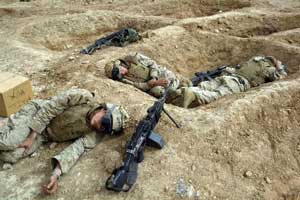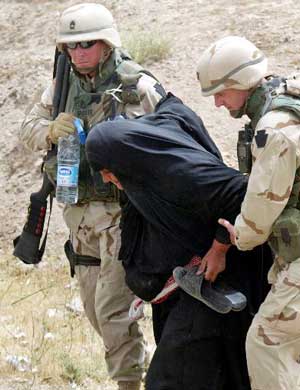|
The Falluja you see on TV night after
night is not the real Falluja, according to an Army
chaplain now serving in Iraq.
 |
Cpl. Will
McDermott, front, from Phoenix, Ariz and other
Marines from the 1st Battalion 5th Marines sleep
in their fighting holes in Fallujah, Iraq
Thursday, April 22, 2004.
(AP Photo/John Moore) |
In a letter in the current Weekly
Intelligence Notes published by the Association of
Former Intelligence Officers, the writer asks why this
troubled city is on the news every night. His answer:
"Because it is one of the few places in all of Iraq
where trouble exists."
He goes on to note that while Iraq has 25 million people
and is the size of California, Falluja and surrounding
towns total just 500,000 people. "Do the math: that's
not a big percentage of Iraq. How many people were
murdered last night in L.A.? Did it make headline news?
Why not?"
According to the writer, the Coalition isn't alone in
having trouble with Falluja. Saddam, he says "could not
and did not control Falluja."
Instead, Saddam "bought off those he could, killed those
he couldn't and played all leaders against one another.
It was and is a 'difficult' town. Nothing new about
that.
"What is new is that outside people have come in to stir
up unrest. How many are there is classified, but let me
tell you this: there are more people in the northeast
Minneapolis gangs than there are causing havoc in
Falluja. Surprised?"
In light of all this, why, he asks is Falluja getting
such massive media coverage? He goes on to explain that
"the major news outlets have camera crews permanently
posted in Falluja."
 |
U.S Army
military policemen Cpt. Kurt Barclay from
Ridgeway, PA, right and Sgt. 1st Class Bernard
Grenier from Hermitage, PA assist a sick Iraqi
woman at a U.S. military checkpoint in Fallujah,
Iraq Thursday, April 22, 2004. The woman wanted to
return to her home in Fallujah, but civilians were
not allowed to return Thursday, so she was taken
to the nearby Jordanian hospital.
(AP Photo/John Moore) |
As a result, if terrorists from
outside Iraq are looking for air time to promote their
cause, where would they go to terrorize, bomb, mutilate
and destroy, knowing their atrocities will be broadcast
around the world instantly? The answer: "Falluja."
That being the case, why does the situation seem to be
getting worse?
Iraq, ruled by the socialist Ba’ath party, became a
welfare state under Saddam. "If you cared about your
welfare, you towed the line or died. The state did your
thinking and your bidding. Want a job? Pledge allegiance
to the Ba’ath party. Want an apartment, a car, etc? Show
loyalty. Electricity, water, sewage, etc. was paid by
the state. Go with the flow: life is good. Don't and
you're dead. Now, what does that do to initiative?
drive? industry?"
Thanks to this sordid history, when we came along and
locked up their sugar daddy we gave the people "the
toughest challenge in the world; freedom. You want a
job? Earn it! A house? Buy it or build it! Security?
Build a police force, army and militia and give it to
yourself. Risk your lives and earn freedom.
"The good news is that millions of Iraqis are doing just
that, and some pay with their lives. But many, many are
struggling with freedom (just like East Germans,
Russians, Czechs, etc.) and they want a sugar daddy, the
U.S.A., to do it all. We refuse. We don't want to be
plantation owners. We make it clear we are here to help,
not own or stay. They get mad about that, sometimes."
Despite all this, the writer says in Falluja, "the
supposed hotbed of dissent in Iraq, countless Iraqis
tell our psy-opers they want to cooperate with us but
are afraid the thugs will slit their throats or kill
their kids. A bad gang can do that to a neighborhood and
a town. That's what is happening here."
Adding to the problem is the military situation: the
largest battle hand-off in recent American history with
the Army "passing the baton to the Marines in this area.
There is uncertainty among the populace and
misinformation being given out by the bad guys. As a
result there is insecurity and the bad guys are testing
the resolve of the Marines and indirectly you, the
American people.
"The bad guys are convinced that Americans have no
stomach for a long haul effort here. They want to drive
us out of here and then resurrect a dictatorship of one
kind or another."
He concludes by asking "what do we do?" and answers
"Stay the course. The Marines will get into a battle
rhythm and, along with other forces and government
agencies, they will drive the thugs across the border
and set the conditions for the Fallujans to join the
freedom parade or rot in their lack of initiative.
"Either way, the choice will be theirs. The alternative?
Turn tail, pull out and leave a power vacuum that will
suck in all of Iraq's neighbors and spark a civil war
that could make Rwanda look like a misdemeanor.
"Hey, America, don't go weak kneed on us: 585 dead
American's made an investment here. That's a whole lot
less than were killed on American highways last month.
Their lives are honored when we stay the course and do
the job we came to do; namely, set the conditions for a
new government and empower these people to be the great
nation they are capable of being."
|